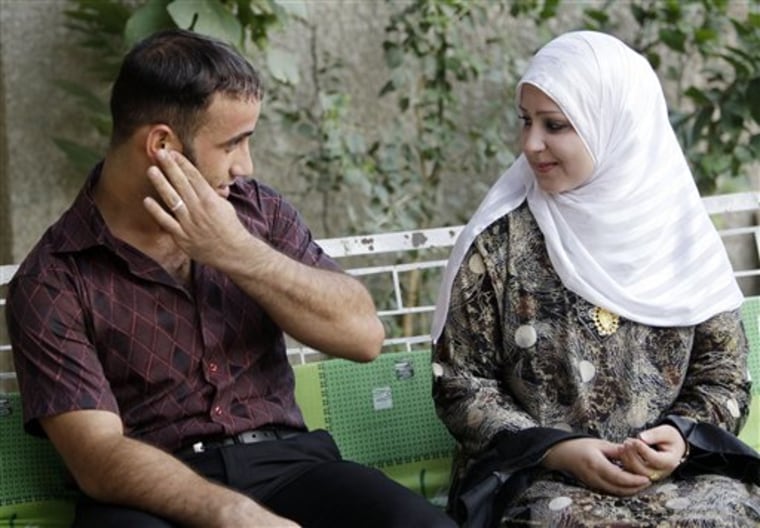Muhanad Talib, a Sunni Muslim, married his Shiite bride because she was a "suitable woman" for him. It also didn't hurt that their vows made them eligible for a $2,000 payout from the government.
Talib and his wife are among more than 1,700 newlywed couples who have accepted cash from a government program that encourages Sunnis and Shiites to tie the knot. The government has held 15 mass weddings for inter-sect couples from all over Iraq, with the most recent taking place last month at a club in western Baghdad once used by Saddam Hussein's army.
While the Iraqi government doesn't track marriages bridging the two major Muslim sects, experts say mixed couples are on the rebound after a dramatic decline during the days of heavy violence. The rise, or rather, the return of mixed marriages appears to be one more sign that Iraqi society is gradually recovering from the war, and that things are more peaceful than they have been in years.
As security has improved, Iraqis are returning to their homes in mixed neighborhoods and spending more time at offices, universities and other places where they meet their future spouses, said Shiite cleric Sayyid Ahmed Hirz al-Yasiri in Baghdad's Shiite stronghold of Sadr City.
Hatred fades with time
"There was a time when families were reluctant to consent to such marriages because of concerns created by certain conservative people from both sects," he said. "That is over now and things are getting back to normal, like they were before the fall of Baghdad. In the past two months, I married 40 to 50 Sunnis, including 20 mixed weddings."
Other clerics echoed al-Yasiri's view.
"My father is a cleric and a marriage official, and I know from him that such marriages are countless and on the rise," said Sheik Omar Abdul-Rahman Rashid, a preacher at al-Rahman Sunni mosque in Azamiyah in northern Baghdad. "Hatred has eventually faded with the passage of time."
Talib, the new groom, smiled at his Shiite bride in the living room of a house the couple shares with relatives in Dora, a primarily Sunni area in south Baghdad.
"I chose her and want to live the best part of my life with her," he said. "We do not discriminate between the two sects. ... This discrimination came from sectarian people."
His wife, Samma Nasir, said shyly: "He has chosen me despite my being Shiite."
Marriage in general is coming back into strong favor. Figures from Iraq's Higher Judicial Council show that 274,014 couples were married in 2007, when sectarian violence was raging. That jumped to 357,593 last year when violence waned. In the first three months of this year, 62,626 marriages were recorded across Iraq, excluding the semiautonomous Kurdish region in the north.
Sheik Hamid al-Adhami, a Sunni cleric and marriage official, said he's marrying four to five couples a month, two or three of whom are mixed-sect. Two judges — Ahmed al-Azzawi in the civil court in Baghdad's central commercial district of Karradah and Karim al-Ithawi in the appeals court in Baghdad's eastern Rusafa district — both said that more people are getting married, and that mixed marriages are now as common as same-sect ones.
Inter-sect unions common before war
The 14-century-old animosity between the sects grew out of a dispute over the succession of Prophet Muhammad, which split the Muslim world into Sunni and Shiite branches. Yet before the war, Sunnis and Shiites mixed freely in Baghdad. Intersect marriages were very common; religious identity was less important than allegiance to Saddam Hussein.
In February 2006, a revered Shiite shrine in Samarra was bombed. Death squads slaughtered people and hundreds of thousands fled the increasingly segregated capital. The incident marked a new high in violence between the sects.
A few months later, the Sunni vice president started a program doling out $2,000 to any Sunni-Shiite couple that tied the knot, in the hope that love would help overcome war.
Hind Khalaf, an Iraqi women's activist, said mixed marriages never completely disappeared from society, but dropped off during the worst years of violence.
"People were too afraid to lose their sons if they let them marry from the other sect," Khalaf said. "Things are gradually returning to normal."
Violence between Shiites and Sunnis has dropped sharply, but the intersect marriage program is going strong. It's no small savings to get help footing the bill for expensive weddings in a nation where nearly one in four people live below the poverty line, defined as living on $2.50 or less per person a day, according to a study released in May by the Central Statistics Authority.
To apply for the money, mixed couples write to Iraqi Vice President Tariq al-Hashemi's office with legal proof of their union. They are handed the cash in an envelope during a mass wedding celebration.
Raad Karim, a Sunni university professor who just got married to a Shiite, received the money last month on a white stage adorned with purple fabric and flowers.
"Iraq witnessed the marriage between Sunnis and Shiites for hundreds of years," said Karim. "We have to resume our Iraqi traditions even though terrorists are trying to erase them."
More on: Sunni and Shiite Muslims | Iraq | mixed marriages
